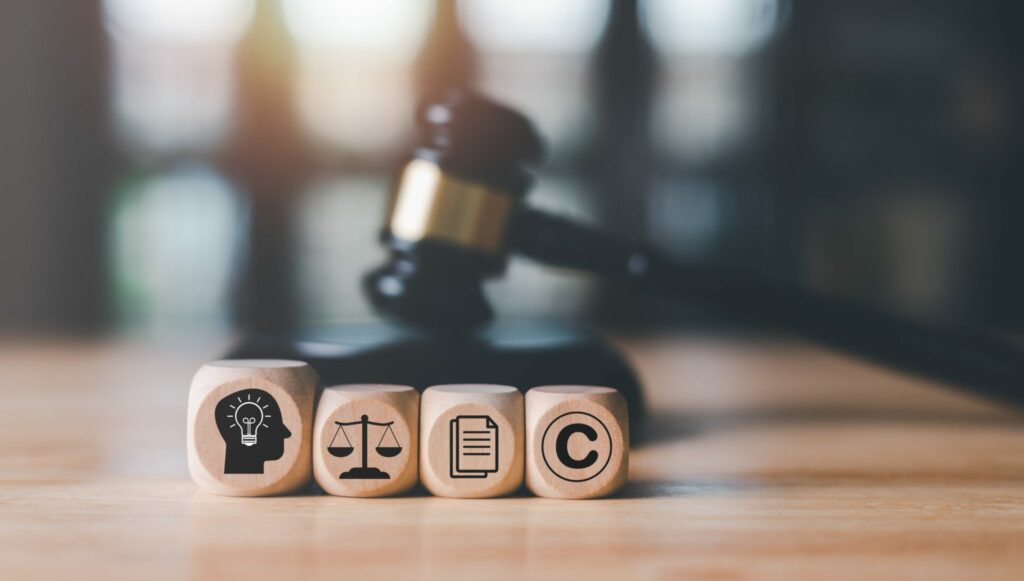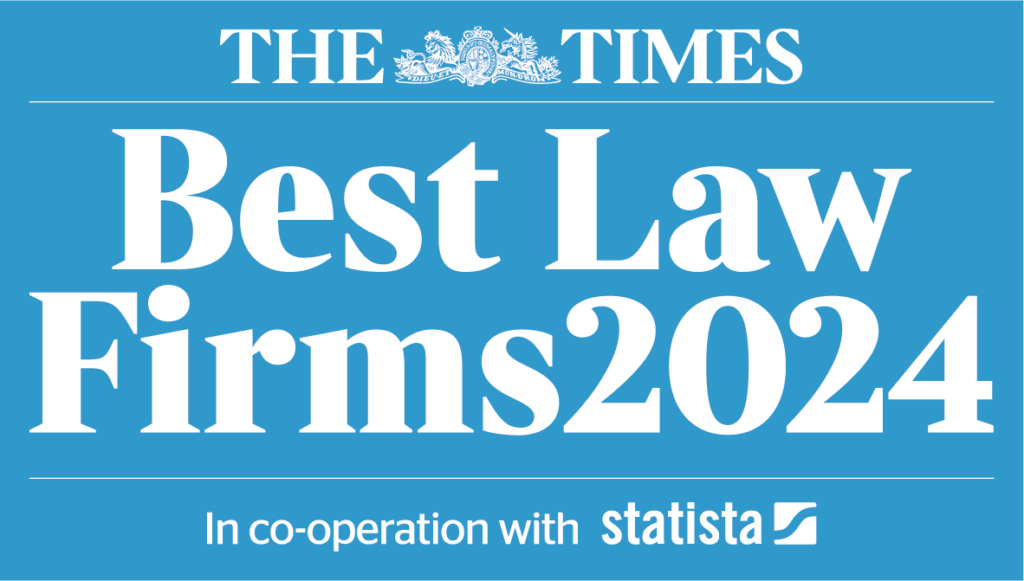Intellectual Property Law
Our experienced Intellectual Property Law team is well recognised, having worked with household names and international brands.
Intellectual Property Lawyers
Intellectual Property (IP) encompasses a vast and diverse array of business property from software and other copyright materials, to designs, logos, inventions and processes. The laws surrounding Intellectual Property fall into a number of areas including copyright, trade marks, design rights and patents.
We can assist you with:
- Brand management and licensing and brand exploitation
- Copyright Protection Advice
- Advice on copyright infringements
- Trade mark advice and applications
- Design right applications, registered designs and renewals
- Advising on IP provisions in commercial contracts
Protecting your Brand
Intellectual property protection essentially serves as a shield and provides the holder with the right to take legal action against anyone who infringes it. This would enable your business to maintain a market-leading position with your creation, particularly in today’s competitive landscape. Whilst some IP arises automatically, some require registrations and therefore obtaining the right legal advice to ensure all necessary protections are in place and that all requirements are met is essential. This is where we can help – our expertise in this area lie in:
- Trade Marks
- Brand Management
- Avoiding Legal Issues
- Brand Licences
- Market Expansion
- International Expansion
- Copyright Protection
Our wide range of services across these areas will ensure that you are able to navigate the complexities of intellectual property law for your brand to remain resilient, adaptable, and poised for enduring success in the marketplace.
IP Portfolio Management
Having gone to the effort and expense of registering your IP, you should ensure your IP is protected going forward by watching for situations where third parties seek to register IP which is similar or identical to yours. Not only this, but it is important to ensure that the registrations you do have are actively used and do not lapse.
Our Intellectual property management service provides you with the opportunity to take action against third parties well before they have the opportunity to register their IP. For example, filing a successful opposition against a new trademark application will prevent it from reaching registration. Since there are strict deadlines to file an opposition following publication, the early warnings provided by our monitoring service are invaluable.
Similarly, we can act as your authorised representative on registrations which means we will ensure that you are notified of any registrations which the IPO consider to be similar to yours and when it is due to expire.
Design Rights
Designs can be protected in a number of ways, for example by registration, through unregistered design rights and by artistic copyright.
If a design is registered, it can protect three-dimensional and possibly two-dimensional designs. The design will also not be limited to the product to which it was originally applied and parts of articles can be protected as designs if they are visible in normal use.
There are requirements that must be met before a design can be registered. Our IP team has a wealth of experience in advising on these requirements, the time periods involved in which to file an application and whether the design falls into the specifically excluded type of design. Once registered, protection can last for 25 years. The procedure for registration is quick and not expensive and registration may help build up the reputation and goodwill relating to the product, particularly when used in conjunction with a strong trademark.
If a design is not registered or not capable of registration, unregistered design rights automatically come into existence by virtue of making products available to the public which incorporate the design. Protection will only last for 10 years from the end of the year of first exploitation or 15 years from the creation of the relevant design document. Proof of infringement would require the owner of the design to show that the defendant had copied the design.
We are also able to advise you on how to manage your registered designs. The advice would include how goods should be marked (to warn would-be infringers) as well as design renewal. Failure to renew your design within the applicable time periods will result in the registration expiring. We also have expertise to assist you in making applications for the restoration of design rights if they have been lost due to a failure to renew them. Once again, there are limited time periods applicable within which to apply for restoration of design rights. It is therefore important to effectively manage your registered designs as there may be certain circumstances where a bone fide third-party will have the right to continue an act (such as importation of a consignment of infringing products) if the design registration has expired and no application for restoration was announced in the Designs Journal during the grace period.
Trademarks
Our team of experienced intellectual property lawyers can help you register a trademark for your business.
We regularly assist clients with the registration of trademarks in the UK. We can also assist, via our international network, with registration of trademarks further afield.
In the UK registration of trademarks is voluntary but advisable as it provides the owner with the exclusive use of the mark in connection with the goods or services for which it is registered. A trademark may consist of words, slogans, domain names, logos, colours, and sounds. The eligibility of the mark will depend on whether it satisfies the statutory criteria to be a trademark.
Intellectual Property (IP) Licenses
Intellectual property (IP) licenses are legal agreements that grant permission to use intellectual property owned by someone else. This IP can include inventions, patents, trademarks, copyrights, or trade secrets
IP licences are a common way for businesses to exploit their IP, giving the licensee the right to use their intellectual property, in exchange for benefits, such as royalties and licence fees.
Businesses use IP licenses for various reasons:
Create a revenue stream: IP licenses allow businesses to generate revenue by granting others the right to use their IP in exchange for licensing fees or royalties.
Market Expansion: Licensing IP can help a business enter new markets or industries where they might not have the resources or expertise to operate effectively.
Risk Mitigation: For some businesses, licensing IP can be a way to mitigate risks associated with manufacturing, distribution, or marketing by allowing other entities to handle these aspects.
Collaboration and Innovation: Licensing IP can encourage collaboration between businesses, fostering innovation and the development of new products or technologies.
Brand Extension: Businesses might license their trademarks or brand names to other companies for use in complementary products or services, extending their brand reach.
Legal Protection: IP licenses define the terms and conditions of use, reducing the risk of IP infringement and providing legal protection for both the licensor and licensee.
IP Audits
Our specialist intellectual property lawyers are able to support you with protecting your IP.
What is an IP audit?
An IP audit is a tool for reviewing the IP owned or used by your business. A comprehensive audit will include:
- identifying the IP assets held by your business;
- searches of the IPO register to determine whether your trade marks and design rights are registered;
- reviewing the IP provisions in key commercial contracts and licences; and
- reporting on the IP help by your business.
IP Audit and Reporting
Our IP audit and reporting retainer comprises of:
- A questionnaire in relation to your business’ IP;
- Searches of the IPO register to determine whether your trade marks and design rights are registered;
- A review of IP provisions in key commercial contracts and IP licences; and
- A report on the IP held by your business and recommended next steps.
Outsourced IP Services
Keeping track of a large IP portfolio can quickly become incredibly time consuming and Herrington Carmichael can assist businesses with keeping track of their intellectual property. For example, we can assist businesses with identifying and protecting their intellectual property, managing legal risks and ensuring that their IP licences are sufficient – our expertise in this area lie in:
- Portfolio Management
- Audit & Reporting
- Intellectual Property Retainers
- IP Watching Services
IP Retainers
We can advise you on IP portfolio management under a retainer. For example, we currently offer the following services under a monthly retainer:
IP watching service
Our IP watching service comprises of:
- Changes of UK trade mark and design right representative / correspondence recipient (as appropriate depending on the requirement of the relevant registry) to Herrington Carmichael
- Maintenance of your UK registrations by monitoring the status of your registrations and submitting timely renewals or cancellations
- Liaison and project management with overseas counsel for non-UK trade marks and design rights regarding oppositions and renewals
- Notifying you of new UK trade mark applications that you may wish to oppose.
IP Audit and Reporting
Our IP audit and reporting retainer comprises of:
- A questionnaire in relation to your business’ IP;
- Searches of the IPO register to determine whether your trade marks and design rights are registered;
- A review of IP provisions in key commercial contracts and IP licences; and
- A report on the IP held by your business and recommended next steps.
IP Disputes & Infringements
Our Dispute Resolution Team are highly experienced at being able to resolve disputes regarding intellectual property and providing pragmatic and commercial advice to you.
Intellectual Property (IP) encompasses a vast and diverse array of business property from software and other copyright materials, to designs, logos, inventions and processes. How can we help?
- Copyright infringement or copyright protection
- Trade Mark infringement or breach
- Design Rights
- Patents
- Confidential Information
IP Training & Workshops
We offer training onsite or we would be pleased host you at our offices.
Alternatively, we can provide training remotely using video conferencing facilities, enabling live Q&A sessions.
Intellectual Property Training & Workshops
Training sessions are designed to meet the needs of your business, addressing repeated issues or new issues your business might face. We are experienced in providing training to staff across all departments, including in-house legal counsel and sales teams, to ensure that they are updated and aware of current intellectual property law and / or relevant intellectual property topics which might affect them in their roles.
Some examples of topics include:
- What are trademarks and how do I register them? Should I license or obtain a license for intellectual property? Key considerations for a licensor or licensee.
- What are the different ways I can protect my brand?
- Buying or selling intellectual property rights – key considerations.
- Importance of managing IP portfolio and consequences of failure to renew registrations.
- Competition law considerations regarding intellectual property
Why should my business receive training on protection of intellectual property?
You will receive knowledge to safeguard your innovations as well as an understanding of the legal frameworks around patents, trademarks, designs, copyrights and trade secrets. By knowing how to properly register and defend these assets will assist in preventing unauthorised use or infringement by competitors.
How can IP law training increase my revenue?
We will provide information on various avenues that can be explored to enable your business to increase its revenue. Licensing deals, partnerships or selling IP rights can generate additional income and contribute to the company’s financial growth.
Why is learning about brand protection important for my business?
Training in this area encourages a culture of protecting the brand identity. Employees become more aware of the value of the brand, importance of protection and ways to protect the brand while preventing dilution or misrepresentation of the brand.
Protecting your Brand
Intellectual property protection essentially serves as a shield and provides the holder with the right to take legal action against anyone who infringes it. This would enable your business to maintain a market-leading position with your creation, particularly in today’s competitive landscape. Whilst some IP arises automatically, some require registrations and therefore obtaining the right legal advice to ensure all necessary protections are in place and that all requirements are met is essential. This is where we can help – our expertise in this area lie in:
- Trade Marks
- Brand Management
- Avoiding Legal Issues
- Brand Licences
- Market Expansion
- International Expansion
- Copyright Protection
Our wide range of services across these areas will ensure that you are able to navigate the complexities of intellectual property law for your brand to remain resilient, adaptable, and poised for enduring success in the marketplace.
IP Portfolio Management
Having gone to the effort and expense of registering your IP, you should ensure your IP is protected going forward by watching for situations where third parties seek to register IP which is similar or identical to yours. Not only this, but it is important to ensure that the registrations you do have are actively used and do not lapse.
Our Intellectual property management service provides you with the opportunity to take action against third parties well before they have the opportunity to register their IP. For example, filing a successful opposition against a new trademark application will prevent it from reaching registration. Since there are strict deadlines to file an opposition following publication, the early warnings provided by our monitoring service are invaluable.
Similarly, we can act as your authorised representative on registrations which means we will ensure that you are notified of any registrations which the IPO consider to be similar to yours and when it is due to expire.
Design Rights
Designs can be protected in a number of ways, for example by registration, through unregistered design rights and by artistic copyright.
If a design is registered, it can protect three-dimensional and possibly two-dimensional designs. The design will also not be limited to the product to which it was originally applied and parts of articles can be protected as designs if they are visible in normal use.
There are requirements that must be met before a design can be registered. Our IP team has a wealth of experience in advising on these requirements, the time periods involved in which to file an application and whether the design falls into the specifically excluded type of design. Once registered, protection can last for 25 years. The procedure for registration is quick and not expensive and registration may help build up the reputation and goodwill relating to the product, particularly when used in conjunction with a strong trademark.
If a design is not registered or not capable of registration, unregistered design rights automatically come into existence by virtue of making products available to the public which incorporate the design. Protection will only last for 10 years from the end of the year of first exploitation or 15 years from the creation of the relevant design document. Proof of infringement would require the owner of the design to show that the defendant had copied the design.
We are also able to advise you on how to manage your registered designs. The advice would include how goods should be marked (to warn would-be infringers) as well as design renewal. Failure to renew your design within the applicable time periods will result in the registration expiring. We also have expertise to assist you in making applications for the restoration of design rights if they have been lost due to a failure to renew them. Once again, there are limited time periods applicable within which to apply for restoration of design rights. It is therefore important to effectively manage your registered designs as there may be certain circumstances where a bone fide third-party will have the right to continue an act (such as importation of a consignment of infringing products) if the design registration has expired and no application for restoration was announced in the Designs Journal during the grace period.
Trademarks
Our team of experienced intellectual property lawyers can help you register a trademark for your business.
We regularly assist clients with the registration of trademarks in the UK. We can also assist, via our international network, with registration of trademarks further afield.
In the UK registration of trademarks is voluntary but advisable as it provides the owner with the exclusive use of the mark in connection with the goods or services for which it is registered. A trademark may consist of words, slogans, domain names, logos, colours, and sounds. The eligibility of the mark will depend on whether it satisfies the statutory criteria to be a trademark.
Intellectual Property (IP) Licenses
Intellectual property (IP) licenses are legal agreements that grant permission to use intellectual property owned by someone else. This IP can include inventions, patents, trademarks, copyrights, or trade secrets
IP licences are a common way for businesses to exploit their IP, giving the licensee the right to use their intellectual property, in exchange for benefits, such as royalties and licence fees.
Businesses use IP licenses for various reasons:
Create a revenue stream: IP licenses allow businesses to generate revenue by granting others the right to use their IP in exchange for licensing fees or royalties.
Market Expansion: Licensing IP can help a business enter new markets or industries where they might not have the resources or expertise to operate effectively.
Risk Mitigation: For some businesses, licensing IP can be a way to mitigate risks associated with manufacturing, distribution, or marketing by allowing other entities to handle these aspects.
Collaboration and Innovation: Licensing IP can encourage collaboration between businesses, fostering innovation and the development of new products or technologies.
Brand Extension: Businesses might license their trademarks or brand names to other companies for use in complementary products or services, extending their brand reach.
Legal Protection: IP licenses define the terms and conditions of use, reducing the risk of IP infringement and providing legal protection for both the licensor and licensee.
IP Audits
Our specialist intellectual property lawyers are able to support you with protecting your IP.
What is an IP audit?
An IP audit is a tool for reviewing the IP owned or used by your business. A comprehensive audit will include:
- identifying the IP assets held by your business;
- searches of the IPO register to determine whether your trade marks and design rights are registered;
- reviewing the IP provisions in key commercial contracts and licences; and
- reporting on the IP help by your business.
IP Audit and Reporting
Our IP audit and reporting retainer comprises of:
- A questionnaire in relation to your business’ IP;
- Searches of the IPO register to determine whether your trade marks and design rights are registered;
- A review of IP provisions in key commercial contracts and IP licences; and
- A report on the IP held by your business and recommended next steps.
Outsourced IP Services
Keeping track of a large IP portfolio can quickly become incredibly time consuming and Herrington Carmichael can assist businesses with keeping track of their intellectual property. For example, we can assist businesses with identifying and protecting their intellectual property, managing legal risks and ensuring that their IP licences are sufficient – our expertise in this area lie in:
- Portfolio Management
- Audit & Reporting
- Intellectual Property Retainers
- IP Watching Services
IP Retainers
We can advise you on IP portfolio management under a retainer. For example, we currently offer the following services under a monthly retainer:
IP watching service
Our IP watching service comprises of:
- Changes of UK trade mark and design right representative / correspondence recipient (as appropriate depending on the requirement of the relevant registry) to Herrington Carmichael
- Maintenance of your UK registrations by monitoring the status of your registrations and submitting timely renewals or cancellations
- Liaison and project management with overseas counsel for non-UK trade marks and design rights regarding oppositions and renewals
- Notifying you of new UK trade mark applications that you may wish to oppose.
IP Audit and Reporting
Our IP audit and reporting retainer comprises of:
- A questionnaire in relation to your business’ IP;
- Searches of the IPO register to determine whether your trade marks and design rights are registered;
- A review of IP provisions in key commercial contracts and IP licences; and
- A report on the IP held by your business and recommended next steps.
IP Disputes & Infringements
Our Dispute Resolution Team are highly experienced at being able to resolve disputes regarding intellectual property and providing pragmatic and commercial advice to you.
Intellectual Property (IP) encompasses a vast and diverse array of business property from software and other copyright materials, to designs, logos, inventions and processes. How can we help?
- Copyright infringement or copyright protection
- Trade Mark infringement or breach
- Design Rights
- Patents
- Confidential Information
IP Training & Workshops
We offer training onsite or we would be pleased host you at our offices.
Alternatively, we can provide training remotely using video conferencing facilities, enabling live Q&A sessions.
Intellectual Property Training & Workshops
Training sessions are designed to meet the needs of your business, addressing repeated issues or new issues your business might face. We are experienced in providing training to staff across all departments, including in-house legal counsel and sales teams, to ensure that they are updated and aware of current intellectual property law and / or relevant intellectual property topics which might affect them in their roles.
Some examples of topics include:
- What are trademarks and how do I register them? Should I license or obtain a license for intellectual property? Key considerations for a licensor or licensee.
- What are the different ways I can protect my brand?
- Buying or selling intellectual property rights – key considerations.
- Importance of managing IP portfolio and consequences of failure to renew registrations.
- Competition law considerations regarding intellectual property
Why should my business receive training on protection of intellectual property?
You will receive knowledge to safeguard your innovations as well as an understanding of the legal frameworks around patents, trademarks, designs, copyrights and trade secrets. By knowing how to properly register and defend these assets will assist in preventing unauthorised use or infringement by competitors.
How can IP law training increase my revenue?
We will provide information on various avenues that can be explored to enable your business to increase its revenue. Licensing deals, partnerships or selling IP rights can generate additional income and contribute to the company’s financial growth.
Why is learning about brand protection important for my business?
Training in this area encourages a culture of protecting the brand identity. Employees become more aware of the value of the brand, importance of protection and ways to protect the brand while preventing dilution or misrepresentation of the brand.
FAQs
What are the differences between assignments and licences of intellectual property rights?
Generally speaking, an assignment of intellectual property rights will pass ownership of those intellectual property rights to the recipient of the assignment. Therefore, depending on the exact terms of the assignment, the previous owner would no longer have rights to use those intellectual property rights. Customers will often request assignments of work created for them. Whilst this is typical, thought needs to be given to whether any intellectual property rights need to be retained for the business moving forward.
Conversely, a licence only gives a right for the recipient to use the intellectual property rights within defined parameters and generally does not pass ownership across. Licences can be exclusive, sole and non-exclusive and these will all having different implications. It is imperative that the type of licence, the parameters on use and consequences of breach are all clearly set out in the contract and accurately reflect the intention of the parties.
The intellectual property clauses are a focal point of many IT contracts where it is important to capture rights not only in the core software, but also in any developments and any supporting materials such as user manuals etc.
Copyright infringement – how can it be avoided?
The Copyright, Designs and Patents Act (1988) acts to support copyright owners in protecting their work from being copied by others. Generally speaking, copyright laws give ownership of work on creation to its author, whereby they will have the exclusive right to reproduce, distribute and display their work. Copyright also gives the owner control as to who can use their creation and how it can be used. An author’s work is protected under copyright laws when the work is created, provided certain conditions are met.
On the contrary, if someone other than the owner of a work wishes to use the copyright owner’s work then, if they do not obtain permission from the owner of the work, they may fall within the ambit of copyright infringement.
There are some uses of copyright work that will not constitute infringement or which are permitted by law – for example, uses intended for specific purposes including research and private study, copying for data analysis and quotation from a work. In performing any of the permitted acts, you must work within the requisite parameters, as otherwise you could very quickly fall out of remits of a permitted act and into the remits of copyright infringement.
If you feel that you have copyright in work which has been copied, we are able to review the works and the alleged copying and give a view on whether a right exists and whether it has been infringed.
Why carry out an IP audit?
IP audits can be hugely useful in establishing what IP is owned by a business and opportunities for business asset protection. For example:
Identify potential gaps in IP protection
Some businesses may be completely unaware that they are sitting on valuable and often unexploited IP which could lead to enormous economic potential and opportunities once discovered. For example, an IP audit could help you to identify opportunities to license your IP to third parties. If a business doesn’t know what IP it has or how to leverage it, it will be at a significant commercial disadvantage compared to its competitors.
Identifying cost savings
The maintenance of registered IP rights often comes at a cost through maintenance fees. Carrying out an IP audit will assist with identifying the registered IP which are unused, under-utilised or otherwise no longer valued.
IP audits can also help to foresee and avoid costly IP disputes in circumstances where they expose potential infringement of third-party rights.
Identifying the risks
IP audits can reveal certain risks from a legal perspective, such as:
- Identifying contractual risks (e.g. restrictions set out in license agreements and contracts that do not capture IP ownership as intended/required)
- Revealing IP assets which are susceptible to being extinguished. For instance, registered trademarks may be cancelled for non-use and use may be resumed in an effort to preserve the registration.
- Reviewing operational activities to ensure the business is compliant the contracts with third parties and the use of third-party IP to avoid infringement or breach of contract.
How much does an IP Audit cost?
We will be able to provide you with a fixed fee to carry out an IP Audit. We will need to find out from you about the assets you hold and understand a bit more about your business after which we would be pleased to provide you with a quote.
Why set up an IP watching service?
The process of watching and conducting regular searches can identify new applications that may be of interest to you and your business, or pose a threat. Carrying out an IP watching service can help you to keep an eye on new registrations and applications and identify whether you should file objections to competitors applications.
Why protect my brand / trade mark?
Registering a trademark provides you with legal rights to exclusively use that mark in connection with your goods or services within the registered classes. It offers legal recourse against anyone who tries to use your mark without permission. It also distinguishes your products or services from competitors and helps consumers identify and remember your brand.
How long does copyright last for in England?
Copyright lasts for a set period, typically the life of the author plus 70 years from the end of the calendar year of the author’s death (subject to a few exceptions under the Copyright, Designs and Patents Act 1988).
How often do I need to renew my trademark?
Trademark renewals are typically required every ten years, and our experienced trademark solicitors will advise you on the maintenance and renewal process.
What are the costs involved in registering a trademark?
We will provide you with a breakdown of the fees, including application fees and professional charges for our services. More information can be found here:
https://www.gov.uk/government/publications/trade-mark-forms-and-fees/trade-mark-forms-and-fees
Legal Insight
Meet the Team
Related expertise
Best Law Firms 2024
Herrington Carmichael has once again been named in the Times Best Law Firms. We were first listed in 2023 and have once again made the Best Law Firms list for 2024.










